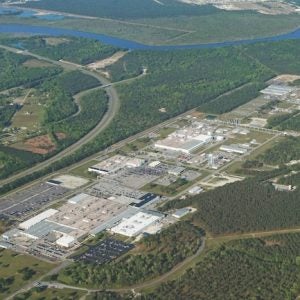Malcolm Wicks, the UK’s new minister of state for energy, told the country’s nuclear industry on 6 July that his department is thinking hard about the nuclear option and he is “genuinely open minded – but hopefully not empty headed.”
The possibility of a “special relationship” between the government and the market was raised as a potential tool to aid nuclear build, as were assurances to investors on matters such as time and cost overruns due to planning permission. Peter Waller of the Department for Trade and Industry said that it is “not impossible” that the market could be tweaked in a way similar to that used to promote renewables, but that central planning by government was a thing of the past.
About 200 delegates packed a lecture theatre at the University of Wales’ Caerleon campus near Newport to hear Wicks speak at the Fuel for Thought nuclear congress, held on 6-7 July. The meeting, organised by the British Nuclear Energy Society, the Institute of Nuclear Engineers, the Institute of Mechanical Engineering, the Nuclear Industry Association and the Safety and Reliability Council, covers the range of nuclear industry in the UK from new nuclear build to nuclear-armed submarine maintenance to the looming skills gap.
Wicks said that rumours about an existing nuclear white paper were false – nothing has yet been drawn up. In fact, there will be no decision in the immediate future as many questions still remain, despite the serious thought energy policy is receiving. Waller said that his department had an increasingly clear idea of the challenges it faced, but had a long way to go.
Regarding the sale of BNFL’s subsidiary Westinghouse, Wicks said the government had thought “long and hard.” One consideration was that it could be thought that the British taxpayer would be exposed to risk from any Westinghouse contract bids. In addition, owning a major reactor vendor would be seen as limiting the government’s openness and transparency if it were to engage the market on the buyers’ side. Lawrie Haynes, chief executive of British Nuclear Group (BNG) added that the government had been very clear on its desire for the British nuclear industry to be focused on clean-up, and in any case, synergies between Westinghouse and the rest of BNFL – particularly BNG – were few.
Any nuclear debate in the country would come as part of a wide-ranging energy policy discussion aimed to find ways for the government to meet its climate change goals, as set out in its energy white paper of 2003. Wicks said that the UK is on track to meet its commitment of 10% of generation from renewables by 2010. The target of 20% by 2020 however, will need rather more effort although the minister believes it is achievable.
Repeating prime minister Tony Blair, Wicks said that a decision on new nuclear build must come in this term of office – the next five years.
Wicks said that, in his opinion, the UK is “fairly well set in different ways” but “time is not on our side.” He does not see a programme of new build to be acceptable before robust radwaste and decommissioning plans have been demonstrated. On this topic, Sir Anthony Cleaver, chairman of the Nuclear Decommissioning Authority (NDA) said: “We really are addressing the legacy – and addressing it really effectively.” Waste management plans are currently in limbo: the
Committee on Radioactive Waste Management is currently forming a recommendation for a long-term waste strategy that is due to be delivered to government in July 2006.
The demographic of the UK nuclear workforce also presents a problem for new build that the NDA is tackling. The 2002 white paper, titled Managing the Nuclear Legacy – a strategy for action, that defined the role of the NDA gave the body ‘general duties’ of promoting, ensuring, maintaining and developing a skilled nuclear workforce. This work would be primarily focused on decommissioning skills, but would also encompass the entire nuclear industry. Ian Hudson, the NDA’s technical and skills development manager said that he believes there is not a major skills issue at the present moment, but there will be in three to five years’ time and now is the time to take steps to create the infrastructure for sustainable skills for the long term.
In a strategy document to be released in about August, the NDA will describe its investigations into: national standards; a possible national laboratory and institute; and a skills academy set up in cooperation with a university in west Cumbria or the north of Scotland. The feasibility of a national scheme to arrange industrial placements for about 40 high-achieving graduates per year will also be considered.
When asked how central planning was acceptable for training but not for new build, Hudson said that the NDA would not own or manage any new institutions, but would merely prompt their existence.
Perhaps the government might see its way to prompting the existence of some new power reactors in the near future but Wicks wasn’t able to give the industry what it wanted – concrete words of intention. But allowing for the constraints of political language, his words and attitude were as positive as anybody could ask for.
Sue Ion, president of the BNES, gave her interpretation of the conference’s overall message during a closing address. She said the government can provide support but cannot take a lead – it is up to the industry to “get your act together and get your message out.” It is essential that decommissioning under the NDA progresses smoothly and quickly and the industry does not “shoot itself in the foot.”
“Business as usual is not good enough.” There is little time between now and July 2006 when CoRWM recommends a waste disposal technique to government. Shortly after that a decision in principle could be taken on long-lived wastes and this could provide the springboard for real steps towards new build.
In the words of Mike Weightman, head of the Nuclear Installations Inspectorate: “The future is exciting, challenging and in our hands.”
Related ArticlesUK energy review announced to protest CoRWM shortlist revealed






